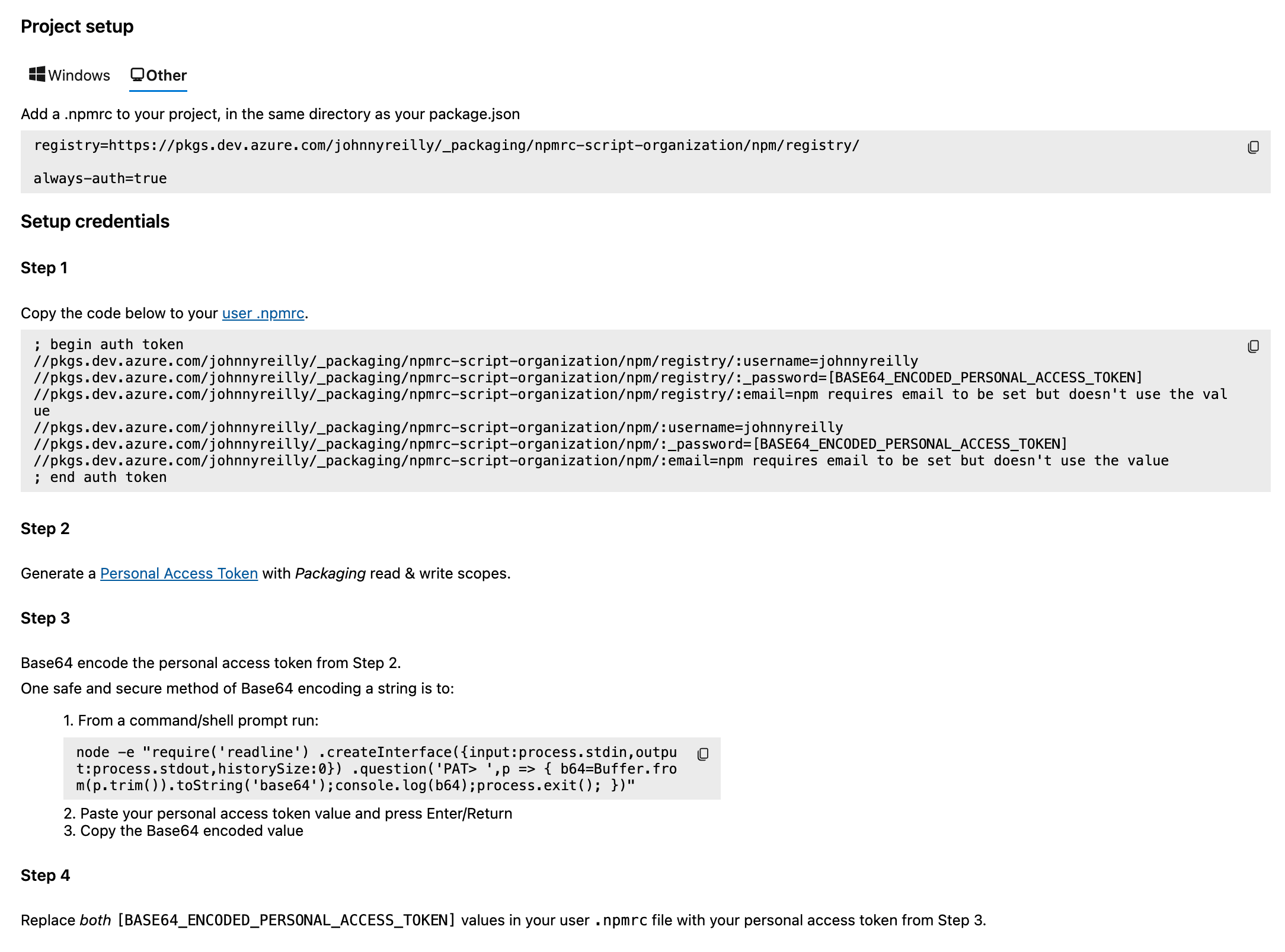Introducing azdo-npm-auth (Azure DevOps npm auth)
Azure DevOps has a feature called Azure Artifacts that supports publishing npm packages to a feed for consumption. Typically those npm packages are intended to be consumed by a restricted audience. To install a package published to a private feed you need to configure authentication, and for non Windows users this is a convoluted process.

azdo-npm-auth exists to ease the setting up of local authentication to Azure DevOps npm feeds, particularly for non Windows users.
What problem are we solving?
Consider the onboarding process for a Windows user for consuming an Azure Artifact npm feed:

Now consider the onboarding process for a non Windows user:

As we can see, there is a significant difference in the onboarding experience between operating systems. Windows users can use a tool named vsts-npm-auth which automates onboarding. Non Windows users have a longer road to follow. The instructions walk through manually creating an .npmrc file in a users home directory which contains information including a base 64 encoded Azure DevOps Personal Access Token with the Packaging read and write scopes. It is tedious to do.
azdo-npm-auth aims to automate the toil, and make the onboarding experience for non Windows users as simple as it is for Windows users.
There is an official package named ado-npm-auth. However, due to issues I experienced in using the ado-npm-auth package, I found myself creating azdo-npm-auth. By the way, the package was briefly named ado-npm-auth-lite; I renamed it as I felt azdo-npm-auth was a better name.
When do I need to run azdo-npm-auth?
Should you encounter the following message when you try to npm i:
npm error code E401
npm error Unable to authenticate, your authentication token seems to be invalid.
npm error To correct this please try logging in again with:
npm error npm login
OR
npm error code E401
npm error Incorrect or missing password.
npm error If you were trying to login, change your password, create an
npm error authentication token or enable two-factor authentication then
npm error that means you likely typed your password in incorrectly.
npm error Please try again, or recover your password at:
npm error https://www.npmjs.com/forgot
npm error
npm error If you were doing some other operation then your saved credentials are
npm error probably out of date. To correct this please try logging in again with:
npm error npm login
That means either:
- You have no user
.npmrcfile OR - The token in your user
.npmrcfile is out of date
In either case, running azdo-npm-auth should resolve the issue. But the way you run it is important. To get azdo-npm-auth to create the necessary user .npmrc file for local development, run the following command:
npx -y --registry https://registry.npmjs.org azdo-npm-auth
It is possible to use environment variables to control the registry setting as well; consider the following (non-Windows compatible) example:
npm_config_registry=https://registry.npmjs.org npx azdo-npm-auth
You might be wondering what the --registry https://registry.npmjs.org part is for. It is a way to ensure that the npx command uses the public npm registry to install azdo-npm-auth. Without this, you might encounter a npm error code E401 error like those above.
Configuration
azdo-npm-auth requires that a project .npmrc file exists in order that it can acquire the information to run.
There is an optional config parameter which allows selection of a specific project .npmrc file. If the config parameter is not supplied, azdo-npm-auth will default to use the .npmrc in the current project directory.
Should you not have one of these files already, there will be information in your Azure DevOps Artifacts section for connecting to the npm feed around creating a project .npmrc file. The required file should look something like this:
registry=https://pkgs.dev.azure.com/johnnyreilly/_packaging/npmrc-script-organization/npm/registry/
always-auth=true
Authenticating to Azure
If you would like azdo-npm-auth to acquire a token on your behalf, then it requires that your Azure DevOps organisation is connected with your Azure account / Microsoft Entra ID. Then, assuming you are authenticated with Azure, it can acquire an Azure DevOps Personal Access Token on your behalf. To authenticate, run az login. If you need to install the Azure CLI, follow these instructions. It is not necessary to run az login if you are already authenticated with Azure.
If you would like to acquire a PAT token manually, there is a --pat option for that very circumstance.
Integration with package.json
Using a preinstall script
A great way to integrate azdo-npm-auth is by using it in a preinstall script in your package.json:
"scripts": {
"preinstall": "npx --yes azdo-npm-auth --config ./subdirectory-with-another-package-json/.npmrc"
},
The --yes flag above simply skips having npm challenge the user as to whether to download the package.
However, as you're probably noticing, this requires having multiple package.jsons and only having the .npmrc file in the nested one. Assuming that works for you, brilliant. It may not - no worries. We'll talk about that in a second.
With the above preinstall script in place, when the user performs npm i or similar, before attempting to install, the relevant user .npmrc file will be put in place so that installation just works™️. This is a great developer experience.
Using an auth script
If the complexity of nested package.jsons doesn't work for you, we generally advise setting up a script like the one below:
"scripts": {
"auth": "npx -y --registry https://registry.npmjs.org azdo-npm-auth"
},
And running npm run auth when a npm error code E401 is encountered. (Your script doesn't have to be called auth necessarily - if you like you could call it fix-code-e401, or something else entirely.)
What about CI?
You might be worried about azdo-npm-auth trying to create user .npmrc files when running CI builds. Happily this does not happen; it detects whether it is running in a CI environment and does not create a user .npmrc file in that case.
Summary
If you're a Mac or a Linux user, hopefully azdo-npm-auth can significantly ease the friction experienced doing local development with Azure DevOps npm feeds. You can see the project code on GitHub here.
